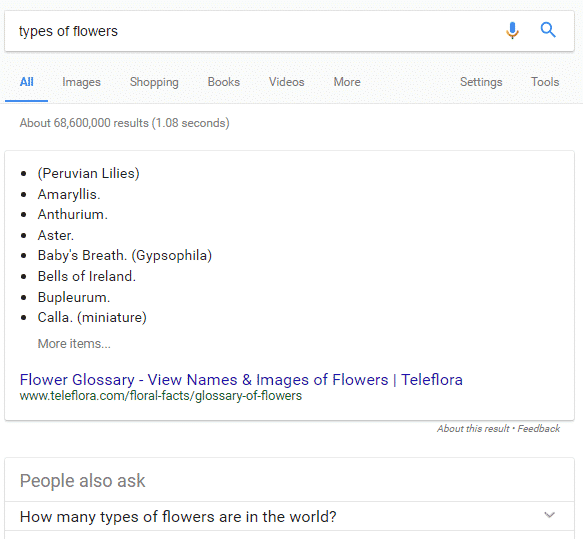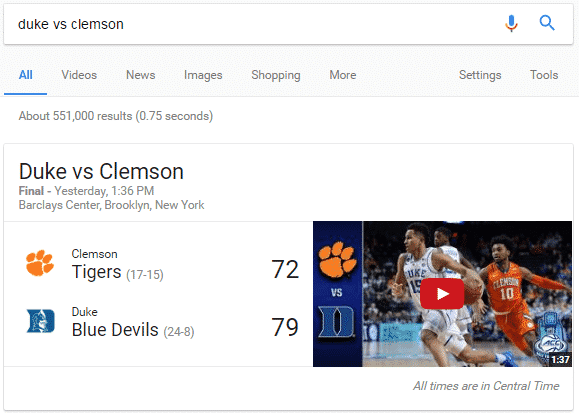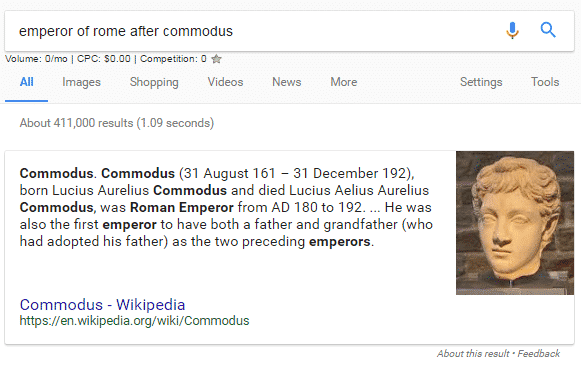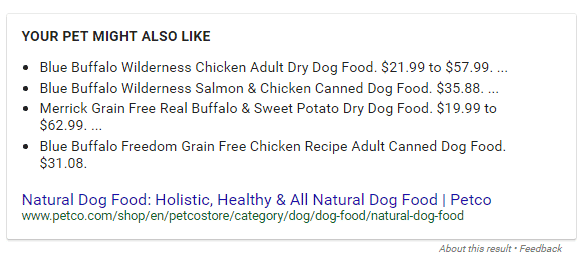Last Updated on March 9, 2017 by Mike
“What is this box being displayed at the top of this search result?” “Is it a paid advertisement?” “Is this information Google is supplying?” “Why is Google choosing to display another website instead of my website?” These are common questions we get related to Google Answer Boxes.
That’s a Google Answer Box. No, it is not a paid search result. No, Google is copying data directly from a web page in its search index. Why is Google displaying information from that particular page? Well, that’s complicated:
A Bit of History
Google started experimenting with answer boxes back in in 2015 to answer the most basic of search query questions. People who are looking for quick and easy answers to questions like “what time is it in London” or “how many feet are in a mile” don’t really need to visit a web page to answer their question, or to get an in-depth answer or explanation to fulfill their query.
Why are Answer Box Results Important?
Google Answer Boxes, also known as featured snippets, appear above every other organic search listing on a Search Engine Result Page (SERP). Higher organic listings lead to higher Click Through Rates (CTRs) which leads to higher website traffic. They also can take up a huge amount of SERP real estate, making the source used for the answer box one of the only logical websites to visit.
Take the search “types of flowers” for example. The answer box takes up a massive amount of the page, and below the answer box is a section for other commonly asked flower questions. I literally have to scroll to view other organic listings for this search query, which means teleflora.com is likely getting nearly 100% CTR for this search query.

What’s more, about 15% of all searches display an answer box.
The Wide Use of Answer Boxes
15% is certainly no surprise when you consider all the uses of the answer boxes. Any search that could be answered by a quick response seems to have a answer box. Take for example last night’s basketball game. Just by searching “duke vs clemson” Google likely knows I want to know the score of the game from last night:

Many different events from concert schedules to movie times can be answered using answer search boxes.
Google Doesn’t Always Get the Answer Right
As many of us know, Google does not always display the most helpful information in search answer boxes. Sometimes answer boxes do nothing to answer our question and other times they provide us with completely wrong or misleading information.
For example, if I wanted to know who was the emperor of Rome after Commodus, I would have done a search like the one seen below. However, the answer box only gave me information about his father and grandfather and did not answer my question.

(For those of you dying to know, Pertinax was the successor to Commodus.)
Google Doesn’t Always Use Informational Pages
I have noticed that there has been an uptick over the last few months in the number of answer boxes displayed in Google search results, and often times the answer boxes are used for search queries that don’t seem to be coming from people seeking information on a topic. Take the search query “all natural pet foods” for example:


There are a number of issues with this particular answer box:
- This is clearly a competitive keyword, which is basically the opposite of an informational based keyword. Pet food suppliers and product pages make up the majority of organic search results and four paid ads are displayed at the top of the page.
- Nothing else displayed in the SERP seems to display information based on a question, so why is there a need for an answer box?
- Google is using a web page from the Petco website that lists their selection of natural dog food products (odd, but whatever). Google chooses to list several products along with their prices in the answer box (why??).
- Why dogs? I was looking for all natural PET food. Does Google hate cats??
Interestingly, Google Answer Box results are not the same based on very similar keyword variations and answer boxes are not displayed for all variations. For example, “all natural pet food” and “natural pet foods” do not have answer boxes (as of right now).
I’m definitely being nitpicky with this critique. Someone who searches for “all natural pet foods” may really be searching for information on TYPES of all natural pet foods and may benefit (in some small way) from an answer box in search results. The crux of the matter is that Google is choosing sources that do not always match the intent of the search query.
Clearly, the use of answer boxes is still in its infancy and needs a whole lot more testing on Google’s part.
What Formats of Information Get Displayed in Answer Boxes?
Google has experimented with many different types of snippets of information displayed in search results. However, the formats of information used for answer boxes that website managers can influence can be narrowed down to three categories:
Paragraphs
This is your standard body copy text found on pages. Google is able to render full Javascript and CSS, so “read more” expandable content or text hidden for user experience purposes can be used by Google for answer boxes. An image may be displayed along with the answer box if one is available from the web page.
Paragraph answer boxes represent about two-thirds of all answer box search queries.
Lists
Information displayed in bullet points, numerical format or as a simple list of items is a common type of answer provided in Google answer boxes.
List answer boxes represent about a third of all answer box search queries.
Tables
Google, like people, likes information displayed in an organized format, which is why tables represent a huge percentage of answer box results. Charts, graphs can also fit in this category.
Table answer boxes represent about a third of all answer box search queries.
A few tips on getting listed in Google answer boxes
Getting listed in answer boxes can be an uphill battle for some certain websites – especially those with weak backlink profiles. However here are some best practices when it comes to getting your content in answer boxes:
Base Content Around FAQs
To take the right first step in appearing in Google answer boxes, you should think about what questions people FREQUENTLY ask that are related to your products or services. Frequently is important because if the question is not asked by many people, Google may not display an answer box for the question.
Think about all the frequently asked questions about your products or services and then turn them into unique pages on your website. Answer boxes are designed to quickly answer questions related to commonly asked questions, and if a page is your website can quickly answer that question, it becomes a prime candidate for an answer box listing.
Format Content Using Google’s Desired Formats
While it may be a no-brainer to provide answers to questions in paragraph format, many people overlook adding headers to each section of the page.
Where applicable, formatting your information using lists and tables may be a good way to grab Google’s attention.
Make Your Content Better Than the Competition
If you’re reading this, you may already have a competitor in mind who has an answer box result. Creating content with lengthier and more in-depth answers, and structuring your content to appease Google can help you jump ahead of your competitor and take the answer box result.
For more information on Google answer boxes I would encourage that you read these great articles:

Leave a Reply